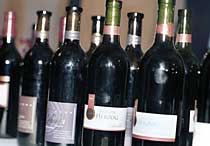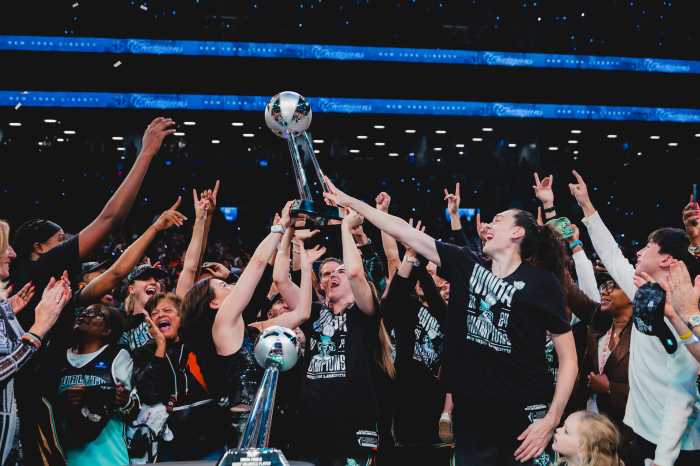If the thought of a pre-Passover wine-tasting
event conjures up the image of a long table studded with syrupy
cups of sweet Concord wine, think again.
On March 30, the Union Temple of Brooklyn, in Prospect Heights,
sponsored a wine-tasting event. Manischewitz wasn’t invited.
The tasting shocked the palates of those accustomed to uncomplicated
holiday wines. It was conducted by Alex Speyer, a sales representative
for the Royal Wine Corporation, a producer, importer and distributor
of upscale kosher wines that was based in Williamsburg for 24
years before moving to Bayonne, N.J., in 2001, and Jack Katz,
the proprietor of Paley Wine & Spirits, who sells the Royal
wines year-round in his Park Slope liquor store.
"These are real wines," said Speyer. "They’re
sophisticated and complex. Some of the wines are slightly sweet,
for dessert, but they’re not the sugared-down wines people are
used to."
In a short presentation, Speyer described the process of making
wine kosher.
"Kosher wines go through the same process as any wines from
any country," said Speyer. "They use the same varietals.
The only difference is, the entire process is handled by Orthodox,
Sabbath-observant Jews." (Sabbath-observant Jews do not
perform any kind of work from sundown on Friday to sundown on
Saturday.)
There are two kinds of kosher wines – non-mevushal and mevushal.
Mevushal means "to boil" in Hebrew. Only Orthodox Jews
can handle non-mevushal wines, in sterilized conditions overseen
by a rabbi. For mevushal wines, grapes, in the juice stage, are
quickly brought to a boil then instantly cooled down. The process
is called flash pasteurization.
"In ancient times, wine was used by pagans for idol worship,"
Speyer explained. "For Jews to differentiate their wine
from that used in idol worship, they boiled it, which [they felt]
rendered it unfit for pagan worship. So we boil the wine to retain
the tradition." After a wine is flash pasteurized it can
be handled by non-Jews and still be considered kosher.
Katz added, "There was a time that boiling the wine ruined
it. It took the life out of it. Now the pasteurizing happens
so quickly that the taste of the wine is still very alive. It
has a sparkle."
In addition to flash pasteurization, certain conditions must
be upheld for wine to be labeled kosher. Following ancient laws,
grapes cannot be harvested from vines that are less than 4 years
old. Every seventh year, the fields must be left fallow with
no other planting allowed between the vines. All the equipment,
tools and storage must be properly sterilized and used only for
the making of kosher wines. No artificial additives, coloring
or preservatives may be used. A rabbi must supervise the entire
wine-making process.
While there were few disappointments, the wines mentioned below
were standouts:
A fruity red Zinfandel from Baron Herzog wineries, in California,
was full-bodied with a slightly smoky flavor and aromas of plum
and cedar. This mevushal wine is a great choice with poultry
and vegetables.
A slightly sweet Bartenura from Moscato D’Asti, in Italy, would
make a perfect aperitif before a big Passover Seder, or as a
light, fresh conclusion to the meal. This crisp white wine had
a bright acidity with delicate flavors of pear, apple and melon
and a floral-like aroma. Its handsome, deep cobalt bottle makes
the wine a great gift. This wine is mevushal.
Another mevushal star of the tasting was a Chardonnay from Segal’s
winery in Israel. The wine was lighter bodied than some and was
"not as oaky as American Chardonnays. More accessible,"
said Katz.
Teal Lake, an Australian producer, was represented with a mevushal
Shiraz. Although the wine was not as rich as one would like,
it did have a slight bite. Its heartiness would pair well with
brisket and roast chicken, staples on many Seder tables.
Evan Kingsley, co-chair of the event, described the origin of
the Union Temple. "The name Union Temple comes from the
merger of two Reform congregations of German Jews from Williamsburg.
In 1929, they moved to this building." The Reform synagogue,
located at 17 Eastern Parkway near Grand Army Plaza, has approximately
200 members.
"We have a fundraiser before Passover every year in order
to engage the temple members and tap into their creative and
competitive energy," said Kingsley. This year the competitive
energy came in the form of a Passover trivia quiz with questions
like, "Name the 10 plagues" and "What was Moses’
first encounter with God in the wilderness?"
"We thought a pre-Passover wine tasting would be enticing
for people," he said. Kingsley’s hunch was correct. Ticket
sales for the event raised $10,000 that will be used to support
Union Temple’s programs and activities. Held in the ornate, gold-and-white
ballroom, 70 congregation members nibbled on hors d’ oeuvres
and sipped kosher Merlot, Cabernet, Zinfandel and Chenin Blanc
from wineries in California, Israel, Australia and Italy. All
the wines were priced from $9 to $17 per bottle.
With kosher wineries producing bottles every bit as good, or
better, than non-kosher wineries, a sophisticated audience should
follow and the memory of the once-a-year, too sweet Passover
wine, should be banished forever.
These shops carry Royal Wine Corporation wines.
Boro Park Wines & Spirits (5502 13th Ave. at 55th Street
in Borough Park) accepts Visa, MasterCard, American Express,
Diners Club and Discover. For information, call (718) 438-8800.
Heights Chateau Wine & Liquor (123 Atlantic Ave. at Clinton
Street in Brooklyn Heights) accepts Visa, MasterCard, American
Express and Discover. For information, call (718) 330-0963.
Paley Wines and Spirits (88 Seventh Ave. at Berkeley Place in
Park Slope) accepts Visa, MasterCard, American Express, Discover
and Carte Blanche. For information, call (718) 857-7008.
Scotto’s Wine Cellar (318 Court St. at Degraw Street in Carroll
Gardens) accepts Visa, MasterCard and American Express. For information,
call (718) 875-5530.
Royal Wine Corporation (63 Le Fante Lane in Bayonne, N.J.) can
be reached at (718) 384-2400 or on their Web site at www.royalwines.com.
























